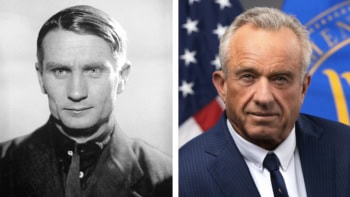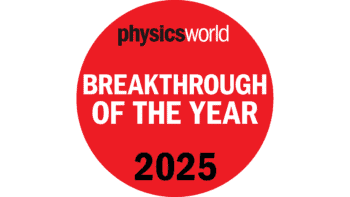Ahead of the upcoming US elections, Robert P Crease describes his tactic for determining the qualifications of candidates

On 6 November Americans go to the polls to elect a president, a third of the US Senate, all 435 members of the House of Representatives, and numerous governors, mayors and local officials. To this extent, it is an ordinary election year. This time around, however, campaigning seems thicker than usual with claims and counter-claims. Many people say they are unsure how to vote.
Not me. I’m a single-issue voter. I vote for the candidates with the most respect for science. I am not saying I necessarily want to see scientists in office; while scientists are prone to wait for definitive answers, political decisions often have to be made before all relevant data are in. I also don’t think political candidates need be scientifically knowledgeable – able to recite π or the periodic table, say. What I am saying is that a necessary qualification for candidates for public office is a respect for the scientific process and its infrastructure.
In case that sounds vague and abstract, let me illustrate. A little over a year ago, Hurricane Irene slammed into the North Carolina coast and made its way north, leaving devastation in its wake. It flooded towns, smashed property, and caused dozens of deaths and many billions of dollars in damage. On Long Island alone it left hundreds of thousands of homes without electricity for days, including mine in Stony Brook. Meteorologists expressed some frustration with their inability to predict the hurricane’s exact path and intensity, citing several unknowns in the myriad factors that govern the paths of storms. More research was needed, they said, before their models would markedly improve. In the light of that uncertainty, what do you think ought to be the rational response for politicians? Is it a to reinforce hurricane safety measures while supporting the efforts of scientists to improve their models? Or b to ignore hurricane warnings, attack hurricane scientists as a self-promoting cabal of dishonest conspirators and de-fund hurricane research?
Ignoring the science
Okay, it’s a stupid example. Only an insane person answers b. But why do more and more political candidates – even current office-holders – resort to a version of b in responding to issues such as climate change, medical care, vaccines, epidemics, evolution and birth control? For instance, the Republican candidate for vice-president, Paul Ryan, wrote an article in the Wisconsin newspaper The Journal Times on 11 December 2009 in which he said that leading climatologists were perverting the scientific method so as to “intentionally mislead the public”. Ryan subsequently reacted to what he felt was uncertainty over climate change by voting to prevent the US Department of Agriculture from implementing a climate-change protection plan, and to eliminate White House climate advisers.
The most outrageous case of ignoring scientific findings in this election – so far – involves Congressman Todd Akin, a Republican from Missouri and a Senate candidate, and a member of the House Committee on Science, Space and Technology. In August Akin defended his opposition to abortion following rape by saying that pregnancy resulting from rape is rare because “the female body has ways to try to shut the whole thing down”. Akin’s remarks directly contradicted numerous studies on pregnancy resulting from rape, such as one published in 1996 in the American Journal of Obstetrics and Gynecology (175 320).
Lest you think that physics is immune from such treatment – or that I am targeting only Republicans – consider Congressman Dennis Kucinich, an Ohio Democrat who, citing possible hazards, introduced a bill requiring radiation warning labels on mobile phones. But although the world’s seven billion people own an astounding 5.6 billion mobile phones, the National Cancer Institute (Journal of the National Cancer Institute 93 166) and other federal scientific agencies agree that there is no scrap of evidence that electromagnetic radiation can break DNA bonds. Though not as repugnant as Akin’s remark, Kucinich’s action involves shameless posturing over a health issue that can needlessly frighten innocent people.
Politics and science are two very different professions. Politicians come up with socially desirable visions and fact-based plans for achieving them, balancing side effects and costs. Scientists collect technical data and other information that may enter into these plans. In normal situations, scientific work is uncontroversial and operates below the political radar. The danger arises when issues become political lightning rods, and ideological aims cause people to override basic, unavoidable facts bearing on health and safety.
Candidates’ views about science are important because these views tend to reflect how the candidate approaches other issues. This is why I look carefully at each candidate’s attitude towards science, reflected in their web pages, pronouncements and voting record. Do they arrive at a decision first, and then cherry-pick information to support it? Or do they inquire first before coming to a decision, respecting and supporting the scientific infrastructure that has been build to acquire such data?
The critical point
“But it’s real for us!
It’s real for us!
Doesn’t matter what the muggles say,
it’s real for us!”
Lauren Fairweather’s affecting song, “It’s real for us”, is a cult classic among Harry Potter fans. It is about how a youngster’s love for the fantasy land of the young magician helps her to cope with the more intractable adult world. This election year, I’m hearing more political candidates than ever express the same sentiment, though neither with Fairweather’s self-conscious irony nor the realization that the election is not about who governs Hogwarts but the US. It’s a world where wishes and wands cannot control things such as hurricanes, disease, pregnancy and evolution.
Do any candidates realize that? Do they have a track record of supporting the network of institutions that’s been established to discover what does control these things? If so, they get my vote.



